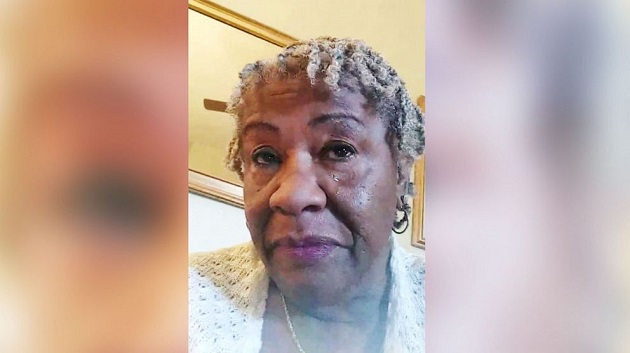Black great-grandmother sues Fort Worth police, claims no-knock warrant 'unlawfully' served on her home
ABC NewsBy BILL HUTCHINSON, ABC News
(FORT WORTH, Texas) — Nelda Price said she and her husband, John, had changed into their nightclothes and settled into their evening routine of watching TV, chatting about the day’s events and getting caught up on the lives of their three children, nine grandchildren and six great-grandchildren.
Around 8 p.m. on March 11, she said their normal evening pattern took an unexpected and frightening turn: Fort Worth, Texas, narcotics detectives served a no-knock warrant, allegedly bursting through their front door without warning, pointing guns and forcing them out onto their front lawn. Price alleges she and her husband were detained for hours as neighbors looked on and officers proceeded to ransack their residence.
The Black senior citizen couple was eventually let go and Nelda Price said the police left empty-handed and without an explanation as to why they subjected them to what she described as “something like a nightmare you don’t forget.”
The case is the latest to cast scrutiny on law enforcement’s use of no-knock warrants in a string of high-profile incidents that are said to have led to fatal police shootings, including one that left Breonna Taylor, a 26-year-old Black Kentucky emergency medical technician, dead. The Fort Worth case is also adding fuel to the national debate over alleged racial profiling by police.
Fed up with what she described as being stonewalled by Fort Worth Police Department officials, Nelda Price, a 69-year-old who just retired as a medical assistant at a gastroenterology practice and at a hospital, filed a lawsuit in U.S. District Court for the Northern District of Texas seeking damages “for acts of racial profiling, unlawful detention, unlawful arrest, excessive force, and inadequate training, committed by members” of the agency.
“The Fort Worth Police had no reason to suspect that (the) Prices, who were relaxing in their home on a weekday evening, were involved in or engaged in any criminal activity, or posed any threat to the safety of the Fort Worth Police Officers or any other individual,” Price’s lawsuit states.
Demands for answers allegedly ignored
Nine months after the ordeal, Price said that while she still doesn’t know why police targeted her home, she said she is certain of one thing: alleging that the stress the raid placed on her husband, who was on heart medication, contributed to his death in May.
“We were married for 51 years and he’s always been a protector where he took care of us,” Price, her eyes filling with tears, told ABC News in a video interview this week. “And in that situation, there was nothing he could do. He really couldn’t even get angry to the point where he could say something because … what could you do with that many policemen around?”
The Fort Worth Police Department declined ABC News’ request for comment on the allegations being levied by Price and have not yet responded to the legal complaint.
“We do not comment on pending litigation,” Laken Rapier, a spokesperson for the City of Fort Worth, said in an email to ABC News.
‘We were sitting there in our pajamas’
Recalling details of the incident she says are still fresh in her mind, Price said police never knocked or announced themselves before they broke through her door.
“We were like sitting there in our pajamas and my gown and not really doing anything than what we normally do and they came in,” she said. “They told us to put our hands up and walk toward them. We did that and asked them why were they here? What did they want? But no one responded to our questions basically and they took us outside and put what I now know are called zip ties on our hands. There were just police all over the place.”
She said officers aggressively peppered her and her husband with questions, inquiring if a Mexican boy had delivered a package to their home.
“And they kept asking us questions and stuff in regards to us having aliases and just different things. It was very nerve-racking,” she said.
Price said that at one point during their detainment outside their home, her husband’s blood pressure began to spike. She said her request to go inside to get his heart medication was repeatedly denied. Eventually, she said, one of the officers summoned paramedics to examine her husband and give him his medication.
“Then a guy walked upon the porch and told them that they had to be at the wrong house,” Price said, adding that the individual was a police officer who had known her husband for years. “They got kind of quiet and they stopped talking to us for a few minutes, and then another guy came up and said that they had been watching the house for a week and nothing was going on here.”
After several hours, Price said the police released them. The couple was never charged with a crime.
“I just thought that was horrible to know that something like that could happen in the United States. I mean, right here in your own city,” Price said. “We have not ever been a set of people who got involved in stuff like this, but I feel like it’s time for somebody to say something. If I can give a voice to it, I will try.”
Lawsuit motivated by Breonna Taylor case
Just two days after the episode at Price’s home, Breonna Taylor died in a hail of 32 shots fired by three white police officers in Louisville, Kentucky, who rammed open the door of her apartment while serving a no-knock search warrant, though the officers claim that they knocked.
None of the officers involved in the shooting were criminally charged with Taylor’s death because her boyfriend allegedly fired the first shot that wounded one of them, according to Kentucky State Attorney General Daniel Cameron. The officers were justified in their use of force, Cameron’s investigation had concluded.
I just thought that was horrible to know that something like that could happen in the United States.
One officer involved in the Taylor shooting, Brett Hankison, was fired from the police department and indicted on wanton endangerment counts for allegedly firing errant bullets that penetrated a wall of Taylor’s home and entered the occupied apartment of her neighbors. Hankison has pleaded not guilty.
Price said the outcome of the Taylor case played a major role in motivating her to take legal action.
She said the October 2019 death of Atatiana Jefferson, a 28-year-old Black woman who was fatally shot by a Fort Worth police officer responding to a welfare check on her home, also influenced her to file the lawsuit. The officer involved in Jefferson’s shooting, Aaron Dean, resigned from the department and was indicted on a murder charge, to which he has pleaded not guilty.
“She doesn’t live five minutes from where I live,” Price said of Jefferson. “We pass her house all the time.”
Kay Van Wey, the Dallas-based attorney who represents Price, said the incident at the Prices’ home fits a troubling history of alleged racial profiling by the Fort Worth Police Department.
In the lawsuit, Van Wey cited Jefferson’s death to support her claim of a pattern of racial profiling. She also cited an incident involving David Collie, an African American Fort Worth resident, who was shot in the back by police in 2016 and paralyzed from the waist down.
“A lot of things have not fixed the problem. Prior lawsuits have not fixed the problem. So what this case is about is trying to fix a known problem,” Van Wey told ABC News.
Van Wey said not only have Fort Worth police officials failed to explain what led them to Price’s home, they have never reached out to her to offer an apology or publicly acknowledge wrongdoing.
“Despite being given opportunities to do right by these good people, all the police department and the city has done is to defend, deny, obstruct, and delay. That just creates more harm. It doesn’t do anything to fix the problem,” Van Wey said.
She said the only hints of why the officers targeted her client’s home come from the search warrant the officers left on the couple’s kitchen table, indicating they were looking for methamphetamine and other drugs.
“Actually, what they accused them of was narcotics trafficking and being members of a narcotics trafficking organization. To me, narcotics trafficking organization sounds like a cartel,” Van Wey said. “Nelda has never had so much as a ticket for jaywalking in her life. She’s just the salt of the earth.”
She said she has also obtained an inventory sheet in which police usually detail evidence seized in a search.
“It’s just marked through as nothing found,” Van Wey said.
She also said the paperwork police left behind, showed officers requested a no-knock warrant because they suspected that announcing their purpose in searching the home would be met with resistance.
“In other words, the judge that signed the search warrant was led to believe that the officers would be met with gunfire, I presume, or there’d be a big shootout or whatever,” Van Wey said. “There were no weapons in the home.”
Price told ABC News that when she and her husband were allowed back into their home, they found it in complete disarray, with the contents of drawers and closets pulled out and dumped on the floor. She also said her new kitchen cabinets, the last home-improvement project she and her husband worked on, were pried away from a wall as if officers had searched behind them.
“To tell you the truth, I feel like my house had been physically raped,” Price said.
She added that she remains traumatized by the event and is frequently spooked by noises while alone in her residence.
“With him (her husband) being gone,” Price said, “it’s still nerve-racking for me to be in the house.”
Copyright © 2020, ABC Audio. All rights reserved.

